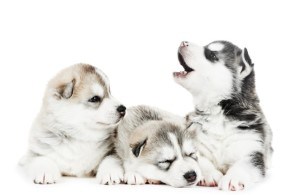Some Siberians have pearly whites that stay that way their entire lives with little or no brushing, whereas others have significant tartar buildup on their teeth within months of a professional cleaning. Keeping your dog’s teeth clean is essential for good health, especially as he ages. Tartar buildup leads to bad breath and periodontal disease, which can cause tooth loss and systemic infection.
pearly whites that stay that way their entire lives with little or no brushing, whereas others have significant tartar buildup on their teeth within months of a professional cleaning. Keeping your dog’s teeth clean is essential for good health, especially as he ages. Tartar buildup leads to bad breath and periodontal disease, which can cause tooth loss and systemic infection.
Chew toys and crunchy foods may help remove some plaque, the precursor to tartar, but regular brushing is necessary to prevent tartar from forming. You can have your veterinarian clean your Siberian Husky’s teeth under anesthesia, or you can easily do it yourself, but don’t use human toothpaste or household baking soda. The ingredients in these products will make your dog sick.
Tooth scalers and tooth-brushing kits designed especially for dogs are available at pet stores and from your veterinarian. Finger toothbrushes, which fit over your index finger, may be easier for you to use and more acceptable to your dog than a hard plastic toothbrush with a handle. Dog toothpaste comes in beef, chicken, and other tasty flavors, and if you start brushing your Siberian’s teeth in puppyhood, he may even look forward to it.
Start by offering your puppy a taste of the toothpaste. Next time, let him taste the toothpaste, then run your finger along the gums of the upper teeth. The next time, repeat the whole process and add the toothbrush. Position the bristles along the gum line of the upper back teeth and angle slightly up, so the bristles can get under the gum line.
Work from back to front, making small circles along the gum lines. It should take less than 30 seconds to brush your Siberian’s teeth. Brushing at least twice a week should keep your Siberian Husky’s teeth clean and bright, but if brushing isn’t enough, you may need to scale his teeth occasionally. Ask your veterinarian or a professional groomer for specific instructions on using tooth scalers. Giving your Siberian a dog biscuit a day will not keep his teeth clean, but it will make the dog happy.
You will also want to check your Siberian’s mouth regularly for chipped or broken teeth, sores or growths, or bleeding. Abnormalities will need to be seen by your veterinarian. If your dog looks as if he wants to eat but won’t, or paws at his mouth, check for tooth infection or a foreign object in his mouth.
According to the American Veterinary Dental Society, 80 percent of dogs show signs of oral disease by age three, and it is the most common health problem treated in small-animal health clinics today. Regular cleaning will keep your Siberian Husky in the 20 percent with no periodontal disease!
Toys
Siberian teeth can slice through the average supermarket dog toy in a matter of seconds, posing choking and obstruction hazards. Plush toys last only as long as it takes him to pull all the stuffing out. Squeaky toys should be offered only under close supervision – you must grab the squeaker before he swallows it.
Consider all balls tennis sized and smaller a choking hazard. Rawhide chews are devoured quickly, and linked to intestinal blockage. Provide your Siberian with chew toys designed for powerful chewers – durable toys he can’t bite into pieces but that satisfy his need to chew and help clean his teeth. Chews made of nylon, polyurethane, or very strong rubber are the most popular Siberian-tested, owner-approved choices.
